 |
Edoardo Puglielli,
Dizionario degli anarchici abruzzesi,
introduction of Massimo Ortalli
Centro Studi Libertari
"Camillo Di Sciullo,
Chieti, 2010, pp. 174, € 10. |
The Dizionario Biografico degli Anarchici Italiani, labor ended a few years ago, who managed to systematize, in immaculate condition over two thousand biographies, and the human framework of Italian anarchist militant, is certainly the beginning of a new season of study. It is followed by new and popular fruit, according to the wish of the curators of that work and the Library Franco Serantini who promoted the edition, new and popular fruit. Historical research on anarchism, in fact, in recent times has focused particular attention to support the reconstruction of the events the subject of their studies, with the reemergence of the figures that were contemporaries of those events. And the results are quite interesting.
It is a convincing example in this volume, featuring collections from Edward Puglielli, who played the Italian Anarchist Federation and young researchers with the assets already numerous essays, biographies of more than one hundred fifty anarchists Abruzzo. Many of these notes, not having appeared in the Biographical Dictionary of Italian anarchists, it should be to integrate the earlier work, completing a definitive framework militant Abruzzo. Since we know that in parallel with this, are underway or nearing completion further research conducted by the same criteria and the same goals - the case of other regions and localities, such as Emilia Romagna, Calabria, Sicily and the provinces of Bergamo and Modena - it is reasonable to expect that this line of studies, stimulated by the important results achieved will not stop until you have produced an accurate representation of the entire panorama of Italian anarchist, adding to the biographies of the most important and popular of those militants base which formed the backbone of the movement. After all, anarchism, by its very nature of movement in substantially horizontal structure and not centralized, more than any other has seen alongside the so-called leaders, for their role and their function they are also outside the image and vitality, a significant critical mass of grassroots activists that, while they left fewer traces in the chronicles or less stimulus to historical research, they nevertheless represented the first guarantee of the impact and importance of the libertarian thinking in the social fabric in which were to operate.
In light of these considerations, it is no wonder that the meticulous work of digging into archives and opening the anarchist publications made by Puglielli send us information so unexpected as interesting, first of all that, even in a region where the Abruzzo "marginal" and peripheral to the great subversive movement of the late nineteenth and first half of the twentieth century, the anarchists were numerous capable of acting effectively in their own territory and relate to the whole of Italian anarchism. And among these, you should see through the pages of the biographical dictionary, were not a few of the characters carat strong national or even international. Moreover, the established belief that he wanted to anarchism and lively, in essence, only in the traditional regions of subversion, such as those of central Italy (Tuscany, Emilia Romagna, Marche and Umbria) and in some areas of the industrial north had already been thoroughly resized the pages of the Biographical Dictionary of Italian anarchists, where they showed, the data in hand, as anarchism was, on the contrary, a movement throughout the country much more homogeneous than one might believe, and how he was able to express almost wherever militants of national importance. Further demonstration, if ever there was a need, that the ideas of emancipation and liberation inherent in the proposal and anarchist in practice they were able to cross all social classes, especially those related to wage labor and craft, and to achieve not only manufacturing or industrial centers, but even the smallest villages. In the interesting list of the anarchists of Abruzzo in the Central Criminal Political kept at the State Archive of Rome, a list that appears at the bottom of this publication, including, significantly, and confirming what we just said, about 450 names, not can not see that, alongside the nuclei consisting of anarchists present L'Aquila in the most important in the region, almost as many groups acted in much smaller towns, such as, for example, Giulianova, Ortona, or Raiano Pescina. If we consider that, in comparison to the militants surveyed, were many more who did not enjoy such attention questurinesche, we can account for the almost ubiquitous presence of the libertarian milieu.
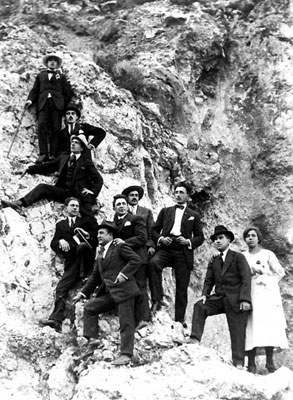 |
Raiano (AQ), 1921, anarchists from
Abruzzo. We recognize, from top to
bottom and from left to right (?), Quirino
Perfect, Alex Farias, Panfilo Di Ciocco, Meta
Louise, with her hand on his shoulder
Umberto Postiglione, Joseph Cerasani,
Frank Caiola, Francesco De Rubeis,
Pasqualina Martino. |
The more than 150 biographical notes gathered by Puglielli, some consisting of just a few lines, given the difficulty of finding info about it here, other more comprehensive and informative, allow to take stock in their homogenous, an overall picture not only of the human active in the region, but also the organizational structure and the militant movement, highlighting the strong sense of shared belonging, with the same intensity from all the anarchists. Special form, in fact, reconstruct the stories of organizations in the area, those relating to small local groups and more or less significant than that of the Anarchist Federation of Abruzzi, a very important story because you know both the ideological and organizational maturity of the movement after the Great War, both the dense network of relationships that libertarians Abruzzo, by no means peripheral or marginal, they were able to set up with their peers nationally.
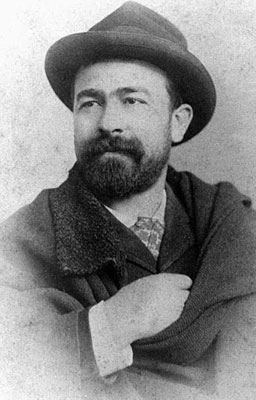 |
Camillo Di Sciullo |
Moreover, this attitude of the anarchists Abruzzo to interact fully with the rest of the movement can be seen for the importance that some of these were for the life of the movement and for the notoriety that accompanied them abroad. Just think, in fact, Carlo Tresca, one of the most important of anarchism and socialism in the United States not only in Italian, at Virgilia D'Andrea, a company that consumed his life lavishing all his energies to the cause , the tragic figure of Severino Di Giovanni, which for better or for worse "move" the chronicles of the thirties Argentine, Antonio and Giovanni Cieri Bifolchi who gave the fight against fascism in Italy and Spain, an irreplaceable contribution to Di Camillo Sciullo, whose editorial production is still preserved in libraries all over the world, and to Umberto Postiglione Francesco Ippoliti, master and doctor, whose memory is still alive where lent, with enthusiasm and neglect their work.
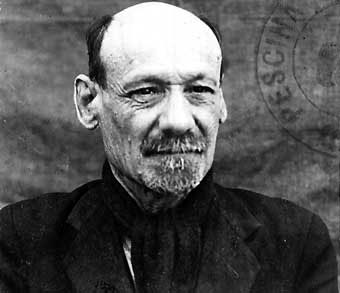 |
Francesco Ippoliti |
Of course the choice of composing a biographical dictionary, as well as allowing you to deepen your knowledge of facts and events, also allows you to highlight the common features of the life experiences of the protagonists. And where, as in this case, anarchists, and subversive rebels, who fought relentlessly against the power and institutions in order to gain space for freedom, there are as constant characteristics, the experiences of prison and house arrest of confinement, repression and exclusion. Are 800 biographies of recent decades, are of the first half of the 900, rule Crispi, Giolitti or Mussolini, the fate of individual change and just report the news collected, all too often, sad vicissitudes of love and hardship. Moreover, already in the Biographical Dictionary of Italian anarchists had highlighted that this attention repressive struck, in greater or lesser extent, the vast majority of biographers. What more do you notice in the fine work of Puglielli, is the significant rate of those who, for political reasons you want to search for a job that otherwise lacked, they had to abandon the native Abruzzo to go abroad. They are, in fact, fifty those who travel to the United States, and 25 others who emigrated to Europe and Argentina. Almost one in two, and then must rebuild a new life abroad, often driven by the relentless repression or, less often, by necessity. If you think the stale cliche of an anarchist intellectual and petty bourgeois, proletarian foreign to the body, there's not really what to say!
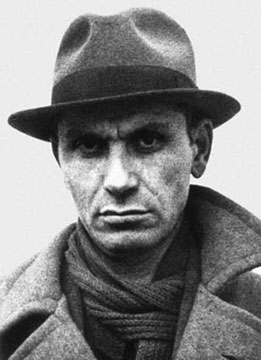 |
Giuseppe Bifolchi |
It is clear that among the many reasons why Puglielli to compile this valuable dictionary, there is mainly to provide a more accurate and fair portrait of what the anarchist movement of Abruzzo, not only to return to the memory of the lives and fortunes, but also to escape easy classification and instrumental. By doing so, not only the work of serious historical research but also to rebuild the image of a meritorious motion surprisingly rich in values and humanity.
 Massimo Ortalli
Massimo Ortalli
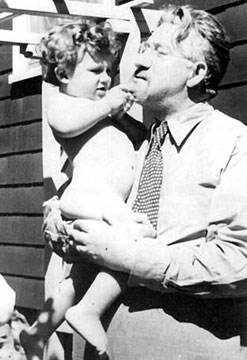 |
Carlo Tresca |
Bios
Conti, Attilio
He was born in Castellammare Adriatico (PE) June 17, 1880 painter. Socialist activist in the local section. Biography in 1902 for "propaganda among the workers and peasants." Skip to anarchism. In 1909, receives and disseminates the number one 'Nihil', Chieti, drawn up by Frederick and Charles Alessandrelli Mola and printed in the typography of Camillo Di Sciullo. That same year, promotes the publication of 'The Scream' sheet libertarians Castellammare Adriatico. Receives, delivers, and writes for "Will." In 1913, contributes to the establishment of a local anarchist group Carlo Pisacane. It is one of the promoters of the Conference of Castellammare Adriatico Sovversivo of February 1, 1914. The conference noted the necessity of practical understanding of the revolutionary base, a court order for unity of action of socialists and anarchists, "the only ones able to create a serious and practical class movement," and endorses the establishment of a regional committee with the task of publicizing the "anti-capitalist revolutionary ideas and principles." Participates in the same month the agitations conducted by the economic improvements to rail against the Libyan war, and against militarism. From 10 to 13 June 1914 took an active part in the strike of the Red Week, having switched to Castellammare Adriatico and rallies in towns and villages in the district. In 1915 he was assigned to Palermo for his military service. Although "in uniform", takes an active part in pro-Tresca mobilizations promoted by anarchists and revolutionary socialists, the agitation ends with street clashes between demonstrators and police. Takes his leave in 1918 and moved to Verona. Claims that the unrest taking hold since the beginning of 1919. Was commissioned to conduct the CDL, in March, announces Italian trade union membership (USI). During the year the union is leading towards a degree course in the context of trade union Verona. The prefecture accounts emphasizes "dangerous agitator and organizer of the masses," introduces "systems even Bolsheviks", prompting workers to submit requests memorials with "over the top" and then immediately declare strike if the management company had not accepted the demands. In 1919, the CDL organizes about 40,000 members, extending its influence to certain categories of workers who remained outside the process of organizing the war. Overall, organized workers in the textile and engineering industries, and public service employees, nurses, barbers, restaurant workers, cleaners, messengers telegraph, the railroad casual laborers, teamsters, drivers, night watchmen, porters, gasisti, tradesmen, laborers, workers and construction workers. During some riots occurred in Lonigo during a workers' strike of a cotton mill, Conti suffers an arrest. Speaker of a meeting of 6 July 1919 in Verona, Armando Borghi, Virgilia D'Andrea, and a representative of the miners of the Valdarno, interventions are fiery, hopefully soon in Italy a revolution on the model of Russia. Heads on the day following an event than a thousand workers against high prices. Denounced for inciting class hatred. In September, following a domestic dispute, has resigned as secretary. Back in Abruzzo. You confederal secretary of the Degree of Castellammare Adriatico up to fascism. Receive and impart "Will." Lidio with Hector and Alexander Picard is one of the speakers at the rally for Soviet Russia Giulianova of 19 October 1919. On November 2, is one of the great orators of the Teramo meeting for the presentation of the candidates promoted by socialists and PSI League Proletarian "Conti lashes that not knowing the vile bourgeoisie respond openly and honestly, after having led the country to disaster, looking for the dribble Election unions and unnatural, the strength to fight the people who step forward threateningly. He remembered how all this is useless because the people are now on their way to redemption, to the triumph of the International. " On the same day in which Giulianova designated speaker for the inauguration of the flag of the local section of the League of Proletarian. Very active in the struggles of two years concurrent on the red on issues such as national and local caroviveri, pacifism el'antimilitarismo, the political and economic emancipation of the proletariat, the freedom and trade union rights. Help variety of demonstrations and popular protests against a repetition of the massacres proletarians. Heads anarchists, socialists and railroad Castellammare Adriatico Pescara and "assault" of a rally that D'Annunzio and nationalists held in Pescara. On the political side has been active in anarchist propaganda, for the reconstruction of the local movement, trying to guide the effort to stress the masses to the formation of groups of FUR. He is one of the main promoters of the route in preparation for the organizational meeting of regional anarchist Sulmona, 20 May 1920, during which they act constituting the FCAA. Between the months of May and June organized groups of anarchists and Guardiagrele Casauria Tocco, both belonging to the FAA. II participates in the congress that the IAU held in Bologna (1-4 July 1920) as director of the Carlo Pisacane. Organizer of the second meeting of the FAA (Castellammare Adriatico, August 15, 1920). On August 29, 1920 is among the speakers at the rally Giulianova at the end of popular mobilization against the massacres proletarians, victims policies and Soviet Russia. Speaker at the meeting of August 30, 1920 Caramanico of massacres against the proletariat and for the freedom of political victims. On September 9, 1920 in Castellammare Adriatico conference organized by William Boldrini, UAE speaker designated by the CDC for a tour of anarchist propaganda in Abruzzo. In November and December protests and rallies to promote the release of political prisoners and for the immediate release of Malatesta, villages and the editors of "Mankind Nova." Arrested in Castellammare Adriatico January 2, 1921 and sentenced by the Assize Court of Brescia in five months in prison for having insulted the army in a rally held in Montagnana, in Padua in 1919. Join the third meeting that the FAA held in Sulmona October 23, 1921. UAE takes part in the III Congress of Ancona (1-4 November 1921). Organizer and speaker at the rally pro-Sacco and Vanzetti of Castellammare Adriatico on 22 October 1921. In 1922, his work as a confederal secretary of the Degree of Castellammare Adriatico is truly remarkable. In January Fossacesia is a League of Resistance of 150 workers, triggering a struggle for higher wages. Also in January Fossacesia speaker at the rally pro-Sacco and Vanzetti at the Teatro Comunale. On March 12, 1922 reorganization of the League of construction workers of Castellammare Adriatico member of the CDL, the new league vote immediately an agenda to combat unemployment. From March 20, 1922 directing the agitation of the workers of the workshop D'Achille, all members of the CDL. In the month of April is the leadership of the section of the Alliance of Labour (ESO) of Castellammare Adriatico. It is one of the organizers of the strike of May and I among the speakers at the rally in Piazza Vittorio Veneto. On the same day among the speakers at the rally Pens. Plan IV conference that the FAA would like to Castellammare Adriatico May 7, 1922. I helped organize the strike organized by the Association in August. With the advent of fascism is subject to supervision and numerous house searches. In correspondence with Francesco Ippoliti in the twenties. Warned in November 1930. On 19 January 1932, after a protest by unemployed workers occurred between Peoples and Bussi, the surveys of a militant cell anarcho-communist active in the province of Chieti and Pescara. In 1935 the prefecture of Pescara order a search of his home because "rabid anti-fascist and placed on the list of people stop in certain circumstances' are seized pamphlets and newspapers of anarchist propaganda. Is cautioned. Arrested and sentenced to five years confinement in Pisticci in November 1940 for political defeatism (for "mumbled" in a tobacconist that "instead of Mussolini's speeches we want bread '). Conditionally released January 14, 1943. The poor health resulting from the mistreatment he died shortly after the Liberation. The first issue of the Socialist rose sheet of Castellammare Adriatico "The Proletarian," published February 18, 1945, commemorates the death of accounts took place a few days, remembering how he had kept still anarchists and anti-fascist rallies until December 1944.
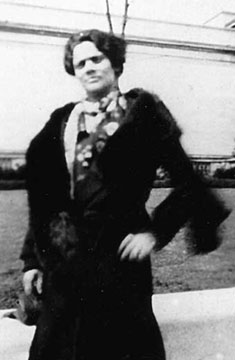 |
Virginia D’Andrea |
D’Andrea, Virgilia
Born in Sulmona (AQ) on February 11, 1888, primary school teacher. Left early an orphan, is entrusted by parents to a college of religious education which impose a rigid dogma that fails in part to escape took refuge in reading. Leopardi, Carducci, Ada Negri are the only companions of his youth alone, nothing comes of life outside the convent in the imagination of the college until 1900, when the nuns forced the girls to pray for the death of King Umberto I was assassinated in Monza from 'anarchist Gaetano Bresci. It is the first meeting with D'Andrea anarchy, filtered through the words of the nuns who define Bresci 'a fool and a criminal. " In 1909, graduating from elementary school teacher, has to leave college and enter into that world, outside the gate of the institute, which knows nothing. She is alone, and loneliness is increasingly a feature of his life, a feeling which often have to abandon, even in the years to come. In Naples, follows the license to teach and began working in some villages near Sulmona, loves those places full of silence and peace, dignity, poor, forgotten, as she will highlight Torch in the Night (New York 1933), the ruling class national, so that when those lands in January 1915 have been devastated by the earthquake, "not a shadow of a king, a duke or a royal princess, he spent a few hours among the ruins." To 1915, when Italy entered the war, D'Andrea is the turning point: the decimation of the conflict, the orphans, the maimed, the infamous massacre of so many young lives led her to make the choice of ' active political engagement, marked by speeches at conferences and lectures against the imperialist war which calls for an early end hoping for an immediate restoration of freedom. In these years he met some members of the anarchist movement Abruzzo and came up with enthusiasm the anarchist ideal. In 1917, just a fellow Abruzzese, the lawyer Mario Trozzi, accompanies all'Impruneta to know Armando Borghi, leader of the anarchist movement and trade union interned here for advocating positions antinterventiste after the turmoil of the week red. It is an important meeting both at public and private sectors at the beginning of a life together until his death. From this moment the police across Italy are starting to follow the D'Andrea in his movements because, as he wrote in 1918 the Prefect of Campobasso, "although it is determined that the D'Andrea live up to direct an anarchist syndicalist movement [...] through the reading of the letters received by the villages, and these are sent to his companions, he notes that the woman mentioned is a center of most faithful of its currency. " Soon D'Andrea denied the prefect about his organizational skills, because being interned in Isernia Borghi and subjected to strict control by the police, is to help keep her alive "class war", the journal of ' USI and liaise with the movement. In 1919, after the war, the two anarchists can leave the border and return to active politics, begins a tour from place to place in central and northern propaganda, meet friends, find new converts. In December of that year a major conference held in Parma in which the University has been reaffirmed by the total autonomy CGdL; occasion D'Andrea is inserted into the central secretariat of the revolutionary trade union. Since 1920, the Milan branch of the University, in Mauri 8, also became the home of D'Andrea, towns and Malatesta, who recently returned to Italy. It is in these days of communal living that is cemented the friendship between Malatesta and D'Andrea, friendship based on mutual respect, shared ideals of life and political activism on the discovery of a strong intellectual proximity. The life of D'Andrea spent frantically between conferences, in public events, compilations of articles for 'class warfare' and 'Nova Humanity, "and other prose which will then be published as Torment (Milan 1922). Malatesta writes for the return of the exile's return, but it is above the world of work that interests her. The manuscript is a jack of 1920 and the surrender of the factories in which workers are described in D'Andrea urges action to fight to defend their rights and demand a better life. These were the postwar years, the non-conversion and high unemployment, the idea of revolution as possible so as occurred in Russia. It is now the opera Resurrection, D'Andrea dedicates "to the rebels of the Ruhr ', in which he recalls the old rebellion of Spartacus offering it to readers as an example of courage for modern insurgencies. On October 27, 1920 D'Andrea knows for the first time the prison has to answer for the crimes of conspiracy against the powers of the State, inciting insurrection, of incitement to murder and condoning of crime. When Dec. 30 comes out of prison after a woman is all but won, stubbornly continues its activity of anti-government propaganda and shall, alone and with few resources, putting out "Mankind nova." The lyrics are not won, made in the days of detention, shows his strong character: no hesitation, if the bars slow down his actions, his words, his poems flying above the boundary of a cell. Poetry as an expression of the ideals of transmission becomes a constant of the action of D'Andrea, so that Malatesta, in the preface to haunt her, the poet does not hesitate to call it anarchy, "She serves as the literature of a weapon; and in the thick of battle, in a crowd and in the face of the enemy or a dark prison cell, from a shelter or friend who escapes from the prison, hurling his verses as a challenge to the bully, an encouragement to sloth, a encouragement to fellow fighters. " In 1923, D'Andrea is with villages to Berlin to participate in the international trade union congress, the stay in Berlin is full of meetings, new knowledge, new business, but also marks the beginning of exile and illness that lead to death. May not return to Italy because she hangs on a new complaint for "incitement to murder" because the publication of Torment. With Borghi went first to Amsterdam, then Paris. Here lives a period of serenity in the antifascist, staying in the Latin Quarter, Rue de Malebranche, he enrolled at the Sorbonne, and founded and directed between 1925 and 1927, the journal Sleep. " As she writes in the editorial of the first issue, 'Sleep' wants to be "the magazine for all anarchists, it is proposed to work for a firm spiritual union between all of us, marriage is so necessary to defend the vital essence of anarchism '. The magazine offers articles ranging from the most topical in the history of the anarchist movement and are often accompanied by photographs. In Paris, in 1925, also publishes the collection of writings from the time Maramaldo at the confluence of his writings on the origins of fascism and the first squads, about Mussolini, but also about life in Paris, a city that celebrated in the verses in the den of the refugees . In 1928 he left Paris to reach U.S. Borghi, who had moved there in 1926. The Italian authorities are careful to communicate immediately to the U.S. that this is a dangerous propagandist and organizer of radical activity. Now D'Andrea shows you what it is: a tireless activist in the anarchist movement, health, a bit 'to improve the claims within a conference held by the United States. Write to Malatesta in 1932: "I continue to work, although health remains very delicate, but I was left alone to hurry and oral propaganda, and the United States are immense. How to satisfy them all? Sometimes they are so physically tired, but unfortunately not new speakers still arise, as they would be so necessary. " His every word, every lesson, every shift is systematically reported to the Italian police and enrich his personal file of "dangerous revolutionary." D'Andrea has a clear and effective oratory, deals with competence and personal insights of the classical themes of anarchism: the freedom, the fight against oppression wherever it comes from, individualism, the company renewed. Even his writings, including numerous speeches on "The Gathering of Refractories," striking lucidity of exposure combined with a rare ability to synthesize, where the theme is the thrust of the historical continuity of thought and action revolutionary "at all times - he says - there were men able to fight the oppressive constraints and false morality, and these struggles have always represented the path of human progress. The action, fighting and those that compress and oppress the freedom of individuals is the fundamental task and the historical role of the anarchists, with the aim of giving rise to a free, happy, with no privileges. " D'Andrea sees in contemporary society to her two big lies: the religion and the homeland. Religion is understood as a condemnation of the progress of reason, freedom of expression, to exercise its rights of criticism and free inquiry, and the country, understood as a state, binding man to self-interest and contrary to the true meaning of the word, ie join the natural man in society from the most basic core, the family, the village to the city. The true feeling of home is one that meets the principles of human solidarity regardless of frontiers. Dell'antiprogresso symbol par excellence is the fascism that restricts all freedom, oppresses consciences, prevents the free development of human thought. The continuous movement, talks, undermining the work of writing more and more physical ill D'Andrea, who in 1932 underwent a first surgery following a hemorrhagic crisis. The pain does not prevent it from continuing to work on the drafting of torches in the night, his last book. On 1 May 1933, the worsening of the disease, a cancer of the rectum, forcing D'Andrea to hospital where he undergoes a new surgical procedure, after 10 days of suffering, died in New York May 12, 1933.
Sources: ACS, CPC, ad nomen; DBAI, vol. I, pp. 486-488.
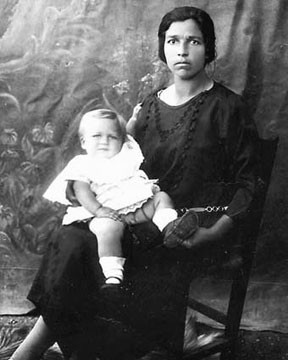 |
Pasqualina Martino |
Martino, Pasqualina
Born in Musellaro (CH) 6 January 1901. Since 1918 is in San Benedetto dei Marsi. Francesco de Rubeis companion. At the end of 1921 is Raiano with Alessandro Farias, Quirino Perfect, Meta Luigi, Giuseppe Cerasani, Frank Caiola, Panfilo Di Ciocco, Francesco De Rubeis and other partners for the inauguration of the House of the People of Raia, the first of Abruzzo, willed and created by Umberto Postiglione. At the same time the doctor returned to San Benedetto Francesco Ippoliti, which holds an affectionate friendship. In November 1922 she was arrested for misuse of the gun port. It undergoes the fascist violence. On December 25, 1922 is obliged to march in procession through the streets of the town with signs on the chest and back with glory and praise to fascism. Illegally, receive and impart "The Gathering of Refractories." In correspondence with Osvaldo Maraviglia exiles and anarchists in the U.S.. Subjected to these various house searches and detentions of PS. Probation until 1942.
Sources: ACS, CPC, b. 1745, f. [De Rubeis Francesco] |

